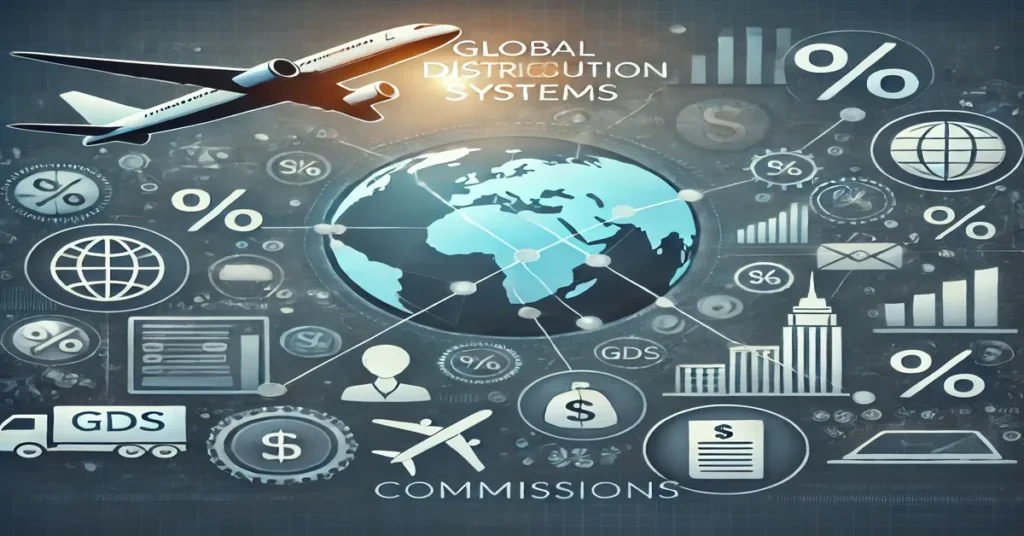How Much Commision Do GDS Give – Global Distribution Systems (GDS) are the backbone of the travel industry, facilitating the distribution and booking of travel services such as flights, hotels, car rentals, and other services across a global network. GDSs play an integral role in connecting suppliers like airlines and hotels with travel agencies, online travel agents (OTAs), and corporate travel management companies. As part of this business model, GDS providers charge a commission for the services they offer, and this commission is often an essential source of revenue for travel agencies and service providers alike.
In this article, we will dive deep into the commission structures that GDSs offer, the factors that influence these rates, and how these commissions impact travel agencies and service providers. We’ll also provide a detailed look into the major players in the GDS market, how their commission systems work, and the broader implications for the travel industry.
1. What is a Global Distribution System (GDS)?
Before we explore the details of GDS commission rates (How Much Commision Do GDS Give), it’s important to understand what a Global Distribution System is and how it functions. A GDS is essentially a centralized computer-based network that enables travel-related transactions. The primary users of GDS systems are travel agencies, both online and offline, and corporate travel departments. The three largest GDS companies globally are Amadeus, Sabre, and Travelport (which includes Galileo, Worldspan, and Apollo).
The GDS connects service providers such as airlines, hotels, and car rental companies with travel agents who make reservations on behalf of customers. Through this system, GDS platforms consolidate availability and pricing data, allowing travel agents to access multiple suppliers in real-time.
For example, when a travel agent searches for a flight or hotel room using a GDS, they can instantly compare prices and availability from several airlines or hotel chains. Once the customer books through the agent, the service provider pays a commission for the use of the GDS platform, which is then distributed to the relevant parties.
2. Commission Structure in GDS Systems
2.1. How GDS Commissions Work
GDS commissions come into play at various stages of the booking process. Typically, these commissions are paid by the travel service providers (such as airlines or hotels) to the travel agents, with the GDS acting as the intermediary. The amount of commission can vary depending on a variety of factors, such as the type of service, the region, the provider, and the specific agreements between suppliers and GDS platforms.
Airlines
Traditionally, airlines paid travel agents a commission for every booking made through the GDS. However, the airline industry has changed significantly in recent years, and many major carriers have reduced or even eliminated commissions paid to travel agents. Despite these shifts, some airlines still offer commission-based incentives for certain routes, classes of service, or travel agents who generate significant volume.
Hotels
Hotels, especially chains and large independent hotels, often offer travel agents a commission for bookings made through GDS. The standard commission rate for hotels is around 10%, although this can vary based on factors like location, season, and hotel policy. Luxury hotels or premium brands may offer higher commissions, sometimes up to 15% or even 20% for premium bookings or exclusive partnerships.
Car Rentals and Other Services
Car rental companies typically offer 5% to 10% commission on GDS bookings, while other services like tours, cruises, and activities may also offer commissions in a similar range.
2.2. Commission Rates by Type of Travel Service
- Flights: Traditionally, airlines offered a commission of around 5% to 10%, but many have moved away from this model. Instead, travel agents may receive a small flat fee or nothing at all. Some premium airlines or niche routes, however, may still offer a commission rate.
- Hotels: Standard commission rates hover around 10%, though some hotels may offer up to 20% for luxury or high-volume bookings.
- Car Rentals: GDS bookings for car rentals generally provide agents with 5% to 10% commission, depending on the car rental company and destination.
- Tours and Cruises: These services can range significantly, with commissions ranging from 10% to 20% depending on the service provider, type of package, and destination.
2.3. How the GDS Makes Money
In addition to the commission earned by travel agents, GDS platforms charge service providers for the privilege of being listed on the system. Airlines, for example, may pay a per booking fee to the GDS, which can range from $2 to $10 per transaction, depending on the volume and specific agreement between the airline and the GDS. Similarly, hotels and car rental companies also pay a fee for each booking made through the GDS.
It’s worth noting that GDS companies often have complex pricing structures that depend on a variety of factors, including the geographic market, the volume of bookings, and the competitive landscape.
3. Factors Influencing GDS Commission Rates
The commission structure of GDSs can be influenced by several factors, making it difficult to give a definitive answer on what the commission percentage will be for a specific transaction. Here are some of the primary factors that affect GDS commissions (How Much Commision Do GDS Give):
3.1. Type of Service Provider
Different types of service providers (airlines, hotels, car rentals, tours, etc.) offer varying commission rates. While hotels and car rentals tend to offer higher commission percentages, airlines have largely shifted to different models and may offer lower commissions or none at all.
3.2. Volume of Bookings
Travel agencies or agents that consistently make high-volume bookings may negotiate higher commission rates with service providers or receive special incentives from the GDS platform. Volume-based agreements incentivize agents to push specific services or providers, as they may be rewarded with higher payouts.
3.3. Geographic Region
Commissions can vary by region, with different countries or markets having distinct commission norms. For example, some regions in Asia or Africa may still offer more traditional commission structures, while North America and Europe have seen reductions in airline commissions over the years.
3.4. Special Promotions or Agreements
From time to time, service providers may offer higher commissions to promote specific routes, hotels, or destinations. Special deals or partnerships between a GDS and a hotel chain, for instance, could lead to temporary commission increases for agents booking through that platform – How Much Commision Do GDS Give.
3.5. Booking Class and Category
Luxury services, premium flights, or high-end hotels may offer higher commission rates than economy flights or budget accommodations. Travel agents may earn a higher commission when booking first-class airline tickets or premium suites in luxury hotels – How Much Commision Do GDS Give.
4. The Major GDS Platforms and Their Commission Systems
4.1. Amadeus
Amadeus is one of the largest GDS platforms globally, with a strong presence in Europe and Asia. It provides access to airlines, hotels, car rental companies, and other travel services. Amadeus charges travel service providers a fee for being listed on the platform and enables travel agents to earn a commission based on the bookings they make.
Amadeus has extensive partnerships with airlines and hotel chains, and while airline commissions are minimal, travel agents using Amadeus can still earn significant commissions from hotels and other service providers.
4.2. Sabre
Sabre is another major player in the GDS market, with a strong presence in North America. Sabre connects travel agents to a wide range of travel service providers, including airlines, hotels, car rental companies, and cruises.
Sabre’s commission structures are similar to those of Amadeus, though there can be variations based on region and service provider agreements. Travel agents using Sabre can expect hotel commissions around 10%, with potential increases for luxury bookings or high-volume clients.
4.3. Travelport (Galileo, Worldspan, Apollo)
Travelport is another leading GDS provider, comprising several brands, including Galileo, Worldspan, and Apollo. Travelport provides a comprehensive GDS solution, connecting travel agents to a wide variety of travel services.
Travelport’s commission structures depend on the service provider and region, but travel agents can generally expect commissions in the range of 10% for hotels and 5% to 10% for car rentals. Commissions for airlines have decreased significantly over time, but there may still be special offers available for agents booking high-end or premium services.
5. The Role of Online Travel Agencies (OTAs)
Online Travel Agencies (OTAs) such as Expedia, Booking.com, and Priceline have transformed the travel industry and the way GDS systems operate. OTAs rely on GDS systems to provide real-time inventory for flights, hotels, and other services. In turn, these OTAs may pass along a portion of the commission to the end customer in the form of discounts or promotions.
OTAs generally have lower operating costs than traditional brick-and-mortar travel agencies, enabling them to offer highly competitive prices. As a result, some suppliers prefer to work directly with OTAs to reduce distribution costs. However, OTAs still rely heavily on GDS platforms for the technology and infrastructure needed to process bookings efficiently.
OTAs often negotiate their commission rates directly with suppliers, meaning that the exact amount they earn per booking may vary depending on the agreement in place. Because of the volume of bookings that OTAs handle, they often have more bargaining power than smaller, independent travel agents.
6. The Future of GDS Commissions
The GDS industry has been undergoing significant changes in recent years, primarily due to technological advancements and shifting trends in how consumers book travel. Some of the future trends in GDS commission structures include:
6.1. Direct Bookings and NDC
One of the biggest disruptors in the GDS market is the rise of NDC (New Distribution Capability), a technology standard developed by IATA that allows airlines to bypass traditional GDS systems and sell directly to consumers. With NDC, airlines can offer more personalized services, dynamic pricing, and richer content, reducing their reliance on GDS platforms and the associated commissions.
As more airlines adopt NDC, GDS platforms may see a decline in their airline business. However, GDS providers are adapting by integrating NDC capabilities into their platforms, ensuring that travel agents can still access rich content and make competitive bookings.
6.2. Rise of API Technology
API-based solutions are becoming increasingly popular in the travel industry. Many service providers, especially low-cost airlines and boutique hotels, are opting to distribute their inventory through APIs instead of relying on GDS platforms. While GDS platforms will likely remain important players, APIs provide an alternative distribution channel with lower fees and commissions.
6.3. Sustainability and Eco-Friendly Travel
As consumers become more eco-conscious, some travel agencies are focusing on sustainable travel options. In response, GDS platforms are starting to incorporate sustainability metrics into their systems, allowing agents to filter results based on eco-friendly criteria. This could lead to new commission structures that reward agents for promoting sustainable travel services – How Much Commision Do GDS Give.
Conclusion
While Global Distribution Systems (GDS) remain essential to the travel industry, the commission structures they offer are complex and vary by service type, provider, and region. Travel agents can typically expect to earn 10% commission on hotel bookings and 5% to 10% on car rentals, with commission rates for flights largely reduced or eliminated in recent years. The rise of online travel agencies (OTAs) and technological innovations like NDC and APIs are shaping the future of the GDS industry, leading to evolving commission structures and new opportunities for travel agencies and suppliers alike – How Much Commision Do GDS Give.
FAQs
1. What is the typical commission rate for GDS hotel bookings?
The typical commission rate for hotel bookings made through GDS platforms is around 10%, although some luxury hotels may offer higher commissions, ranging from 15% to 20%.
2. Do airlines still pay commissions to travel agents through GDS systems?
Many major airlines have reduced or eliminated commissions for travel agents booking through GDS systems. However, some premium or niche routes may still offer commission incentives to travel agents.
3. How do car rental companies use GDS systems, and what commission do they offer?
Car rental companies list their services on GDS platforms and typically offer travel agents 5% to 10% commission on bookings.
4. How do volume-based agreements impact GDS commissions?
Travel agents or agencies that generate high volumes of bookings may negotiate higher commission rates or receive special incentives from service providers or GDS platforms.
5. What role do OTAs play in the GDS commission structure?
Online Travel Agencies (OTAs) such as Expedia and Booking.com use GDS systems to source inventory and may negotiate lower commission rates based on their high booking volume.
6. How are technological advancements like NDC affecting GDS commission structures?
Technologies like NDC allow airlines to sell directly to consumers, potentially reducing their reliance on GDS platforms and the associated commission fees. However, GDS providers are integrating NDC capabilities to remain competitive.







